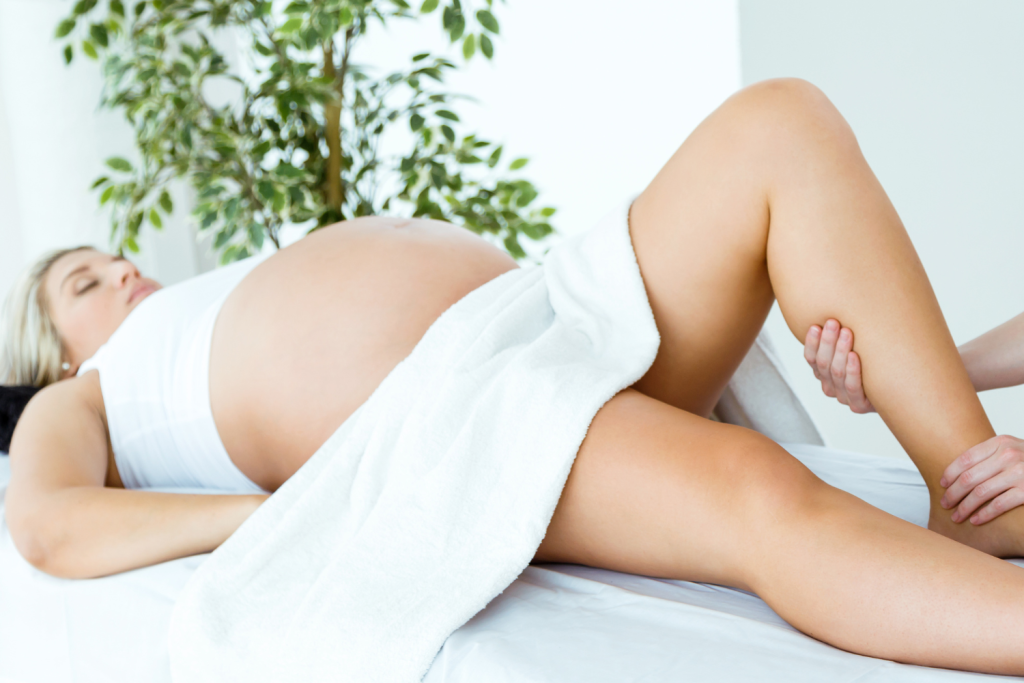
Renata França drainage for pregnant women is a type of massage designed to relieve tension and pain in the legs and feet of pregnant women.
It is a manual technique that consists of pressure and sliding movements on the legs and feet of the pregnant woman to promote blood and lymphatic circulation and to relieve tension and pain.
Renata França drainage is particularly indicated for pregnant women who have problems with heavy legs, varicose veins or swelling in the legs and feet. This technique must be performed by a person trained and certified in this technique.
It is recommended that you consult with a physician or healthcare professional such as a midwife before receiving Renata França drainage to ensure that this technique is appropriate for your condition and pregnancy.
Fluid retention is common during pregnancy. It manifests itself as swelling and edema (abnormal accumulation of fluid in the tissues) in certain parts of the body, particularly the legs, feet and hands.
Fluid retention during pregnancy is usually due to hormonal changes that occur during pregnancy. These changes are caused by the increased production of the pregnancy hormone progesterone, which, among other things, relaxes smooth muscle and reduces vascular tone, which can lead to fluid accumulation in the tissues.
Other factors can also contribute to fluid retention during pregnancy, including lack of exercise, eating too much salt, being overweight and standing or sitting for long periods of time. It’s important to talk to your doctor or healthcare professional if you have persistent bloating during pregnancy, as it may be a sign of an underlying medical condition that needs treatment. Simple measures, such as exercising regularly, avoiding salty foods and wearing comfortable shoes, socks or stockings, can help prevent fluid retention during pregnancy.
This manual technique is practiced on a massage table.
It consists of pressure and gliding movements on the legs and feet of the pregnant woman. Here is how a Renata França drainage session for pregnant women usually works:
1. The pregnant woman lies down on the massage table, on her back or on her side, depending on her comfort.
2. The masseur begins by massaging the pregnant woman’s legs and feet with pressure and gliding movements, using mainly the fingers and hands.
3. The masseur can also use a fragrance-free massage cream or oil to help the pregnant woman relax and unwind.
4. The Renata França drainage session usually lasts from 30 to 60 minutes, depending on the needs of the pregnant woman.
The precise indications of Renata França drainage: it is a massage technique that aims to relieve tension and pain in the legs and feet. It is particularly indicated in the following situations:
Vodder Lymphatic Drainage and Renata França Drainage are two massage techniques that aim to promote blood and lymphatic circulation in the body and relieve tension and pain.
However, there are some differences between these two techniques:
1. Origin: Vodder Lymphatic Drainage is a massage technique developed by Dr. Emil Vodder and his wife, massage therapist Emilie Vodder, in the 1930s. Renata França Drainage is a massage technique created by the Brazilian physiotherapist Renata França in the 1980s.
2. Objectives: Vodder Lymphatic Drainage is primarily intended to promote lymphatic circulation and eliminate toxins from the body. The Renata França drainage, on the other hand, aims to relieve tension and pain in the legs and feet, especially in pregnant women.
3. Techniques: Vodder lymphatic drainage is characterized by light pressure and palpation movements performed on the body, following the path of the lymph. Renata França drainage is practiced on the legs and feet, and consists of pressure and sliding movements performed with the fingers and hands.
Physical activity can be beneficial to reduce water retention in the body. In fact, physical exercise, even for pregnant women, will help improve blood and lymphatic circulation. It is recommended to practice a regular physical activity, preferably at a moderate pace, to benefit from its beneficial effects on water retention, and adapted to your physical condition and your current pregnancy. For example, you can walk, swim or do yoga, depending on your preferences and your physical condition. It is important to drink enough water before, during and after exercise to avoid dehydration. It is recommended that you talk to your doctor, or the health care professional who is monitoring your pregnancy, before starting an exercise program to make sure you have no contraindications. The health care professional can advise you on physical activities that are appropriate for your physical condition and needs.
In conclusion, it is important during this very special time to take care of yourself with natural methods that are adapted to your health condition. It’s good for you physically and mentally too!
Comments